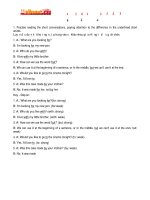giai bai tap sbt tieng anh lop 9 chuong trinh moi unit 4 teen stress and pressure
Bạn đang xem bản rút gọn của tài liệu. Xem và tải ngay bản đầy đủ của tài liệu tại đây (975.51 KB, 13 trang )
VnDoc - Tải tài liệu, văn bản pháp luật, biểu mẫu miễn phí
A. Phonetics - trang 31 - Unit 4 - Sách bài tập (SBT) tiếng Anh 9 mới
1. Circle the underlined auxiliary verbs if they are stressed. Then practise saying the conversations with
a partner.
Khoanh tròn các động từ khuyết thiếu sau nếu chúng được nhấn mạnh. Luyện nói với bạn bè.
1. - Don't you see the sign?
- Yes, I do, but what does it mean?
- It means you mustn't walk on the grass.
2. - You don't have the key, do you?
- No, I don't. I'm going to climb through the window.
- Are you really?
- Just kidding. I'm using the back door. It isn't locked.
3. - I've just come back from Scotland.
- Wow... Did you visit Edinburgh?
- Yes, I did, and I spent a whole day on the Royal Mile.
- I do wish I could visit it one day.
Key - Đáp án:
B. Vocabulary & Grammar - trang 31 - Unit 4 - Sách bài tập (SBT) tiếng Anh 9 mới
VnDoc - Tải tài liệu, văn bản pháp luật, biểu mẫu miễn phí
1. Use the verbs below in their correct forms to complete the sentences.
Sử dụng dạng đúng của các động từ dưới đây để hoàn thành các câu sau.
transport
light
act out
change
preserve
worry
communicate
pass down
1. My grandparents used____________their house with oil lamps.
2. - I wonder how the farmers used_________their crops home in the past.
- They used buffalo-drawn carts.
3. We are making a great effort to___________our valuable customs for the future.
4. Children love _______________the stories as they tell them.
5. Today teenagers have__________a lot in comparison with teens in the past, especially in the way they
spend their free time.
6. Women in the past did not have to_____________-too much about their weight, diets, or obesity.
7. Customs and traditions are ___________from generation to generation.
8. ______________by instant messaging has become an essential feature of teens'social life.
Key - Đáp án:
1. to light
4. to act out/acting out
7. used to be
2. to transport
3. preserve
5. changed
8. Communicating/Communication
2. Match the words/phrases with their definitions.
Key - Đáp án:
6. worry
VnDoc - Tải tài liệu, văn bản pháp luật, biểu mẫu miễn phí
1. d
2. f
3. h
4. g
5. c
6. a
7. e
8. b
3. Choose suitable words/phrases from 2 to complete the conversation.
Chọn từ thích hợp từ bài 2 để hoàn thành đoạn hội thoại dưới đây.
A: What's your favourite (1)____________ ?
B: I have many pastimes, but I love reading the most.
A: You can easily do that at home, so I suppose you don't often go out.
B: I live in an (2)___________ where there are many (3)___________ living
together. So the house is usually crowded and noisy, and I can hardly concentrate on my reading. That's
why I usually go to the library to read.
A: Is there any type of (4)___________ that you can enjoy at home?
B: Of course there is. For example, I can play with my pets, watch TV, or...
A: What happens if your grandparents like watching different programmes from yours?
B: I will compromise. It's (5)___________ that we have respect for (6)
A: Wow... You must be a very tolerant person!
Key - Đáp án:
1. pastime
4. entertainment
2. extended family
5. a family tradition
3. generations
6. seniority
4. Use ‘used to’ or ‘didn't use to’ with the right form of the verbs in brackets to complete the sentences.
Sử dụng ‘used to’ hoặc ‘didn't use to’ với dạng đúng của từ trong ngoặc để hoàn thành các câu sau.
1. My brother_____________interested in Geography when he was at school (not/be)
2. It might surprise you to know that he_________a wild life, (lead)
3. Paper money___________on these Pacific islands, (not/be used)
4. When David was young, he __________of becoming a magician (dream)
5. Our school_________elective subjects, (not/have)
6. This was my favourite bicycle. I____________-everywhere on it. (ride)
7. Entertainment for the children in my village__________as simple playing hide-and-seek, or going
swimming in the river (be)
8. Houses______in light yellow only. They were not as diverse colour as they are now. (be painted)
VnDoc - Tải tài liệu, văn bản pháp luật, biểu mẫu miễn phí
Key - Đáp án:
1. didn't use to be
2. used to lead
4. used to dream
5. didn't use to have
7. used to be
3. didn't use to be used
6. used to ride
8. used to be painted
5. For each group choose the correct sentense A or B.
Chọn đáp án đúng ở mỗi nhóm A hoặc B.
1. A. She wishes she could have a longer summer vacation.
B. She wishes she can have a longer summer vacation.
2. A. It is getting dark and they wish they will soon find a motel.
B. It is getting dark and they wish they would soon find a mote:
3. A. Did you use write with a fountain pen? I can see an ink stain here.
B. Did you use to write with a fountain pen? I can see an ink stain here.
4. A. I wish I had a laptop to replace this old-fashioned computer.
B. I wish I have a laptop to replace this old-fashioned computer
5. A. Trees use to fully cover this bare hill.
B. Trees used to fully cover this bare hill.
6. A. They are building a new airport in my area. I wish they aren't
B. They are building a new airport in my area. I wish they werent't
7. A. This method didn't use to work as effectively as it does no*.
B. This method didn't use to work effectively as it does now.
8. A. I wish I was travelling on an express train, not this slow one
B. I wish I am travelling on an express train, not this slow one.
Key - Đáp án:
1. A
2. B
7. A
8. A
3. B
4. A
5. B
6. Choose the one underlined word/phrase which is grammatically incorrect.
6. B
VnDoc - Tải tài liệu, văn bản pháp luật, biểu mẫu miễn phí
Key - Đáp án:
1. A
C
7. C
2. A
6. B
8. D
3. B
9. B
4. B
5.
10. D
C. Speaking - trang 34 - Sách bài tập (SBT) tiếng Anh 9 mới
1. Use one of the expressions (A-H) to respond to each of the statements (1-8). Then practise the short
conversations with a friend.
Sử dụng các đáp án từ A-H để hoàn thành mỗi đoạn hội thoại. Thực hành với bạn bè.
VnDoc - Tải tài liệu, văn bản pháp luật, biểu mẫu miễn phí
Key - Đáp án:
VnDoc - Tải tài liệu, văn bản pháp luật, biểu mẫu miễn phí
1. C
B
2. F
7. H
3. A
4. D
5. E
6.
8. G
2. Rearrange the sentences to make a complete conversation. Then practise it with a friend. The firs one
has been marked for you.
Sắp xếp lại các câu sau thành đoạn hội thoại hoàn chỉnh. Luyện tập với bạn bè. Câu đầu tiên đã được
làm mẫu.
______ A. Your grandmother taught me. Cooking used to be one of the criteria for being a good wife.
______ B. I'm happy that life has changed.
______ C. Why so many ‘shoulds’, mum? Didn't a wife have any rights in the family?
___1__ D. Mum, how can you cook these traditional dishes?
______ E. There are many. You should know how to sew and how to embroider. You should take care
of every member in your husband's family. You should be obedient and submissive. When you talk, you
should...
______ F. What are some of the other criteria?
______ G. Very few, dear. When you were married to a man, you had to obey the man as well as his
family. You didn't have a voice in the decision making.
______ H. I am too.
--> The right order is:_______________
Key - Đáp án:
Thứ tự đúng là: D-A-F-E-C-G-B-H
D. Reading - trang 35 - Unit 4 - Sách bài tập (SBT) tiếng Anh 9 mới
1. What are these people doing?
Những người này đang làm gì?
a. Match the headlines (A-D) with the situations (1-4).
Nối các đáp án A-D với các vị trí 1-4.
VnDoc - Tải tài liệu, văn bản pháp luật, biểu mẫu miễn phí
Key - Đáp án:
1. B
2. A
3. D
4. C
b. Which answer (A, B, or C) is closest in meaning to the phrases taken from the passages above?
Đáp án nào sau đây mang nghĩa gần nhất với câu đã cho trong đoạn văn trên.
1. '...how to discover and follow the tracks of a game.’ [passage 1)
A. how to find and follow an animal
B. howto play the game of hunting
C. how to discover the rules of the game
2. those of cultural or historic value.’(passage 2)
A. things which costa lot of money
B. things which show people the history and culture of a place
C. the price of culture and history
3. some research on an aspect of life, or events, in the past.’ (passage 3)
A. a study of past life
VnDoc - Tải tài liệu, văn bản pháp luật, biểu mẫu miễn phí
B. search for objects relating to the past
C. retell past events
4. ‘Not every traditional activity at a festival is appreciated.’ {passage 4)
A. Some activities at a festival are not traditional.
B. People do not appreciate festivals.
C. Some activities are no longer approp in modern times.
Key - Đáp án:
1. A
2. B
3. A
4. C
2. Read the passage and choose the correct answer A, B, C, or D.
Đọc đoạn văn sau và chọn đáp án đúng A, B, C hoặc D.
ROOTED IN THE PAST
Good manners are a treasure to the people who possess them, as well as to the community they live
Manners are taught, learnt, and passed from generation to generation.
Even hundreds of years ago, children were taught to behave responsibly. They learnt to respect senio
When they passed an object to another person, they had to use both hands. When they entered a room,
they had to bow and greet the oldest person first. Boys learnt to work hard to support their families,
learnt to do housework, and to take care of others. Loyalty and honesty were highly appreciated. When
they made a mistake, they would not let another person be punished for it.That would be cowardly a
mean. They were taught that families were strong, and everybody should stick together in adversity.
Fortunately, many of these values have been well preserved. They have contributed to making unique
Vietnamese culture, and strengthening our society.
1. Good manners are_____________________.
A. of great value
only for the old
B. of the community
C. traditional
D.
2. What was seen as a boy's main duty?
A. to respect seniority
C. to do housework
B. to support his family
D. to share good things
3. The sentence: ‘When they made a mistake, they would not let another person be punished for it means
they would_____.
A. deny their mistake
B. admit their mistake
C. keep it a secret
D. be punished
4. The underlined word ‘they’ refers to______________.
VnDoc - Tải tài liệu, văn bản pháp luật, biểu mẫu miễn phí
A. tradition
B. generations
C. children
D. seniority
5. ‘... cowardly and mean’ is used to describe_________behaviour.
A. acceptable
B. good
C. proper
D. unacceptable
6. This passage is about________.
A. people who possess good manners
C. the preservation of bad values
B. what bad manners children in the past had
D. good
Key - Đáp án:
1. A
2. B
3. B
4. C
5. D
6. D
3. Choose the correct answer A, B, C, or D to complete the passage.
Chọn đáp án đúng A, B, C hoặc D để hoàn thành đoạn văn sau.
As child, Phong always dreamt of going (1)______to study, he graduated from high school, his parents
sent him over to New Zealand to attend college. Phong was very happy that his dream finally
(3)_____true.
When he first arrived in the country, Phong's English was not very good and sometimes he did not
(4)___ what other people said. He also had difficulties in class because he was not familiar with the new
teaching and learning method. He felt (5)_______ in this new place,and missed all his buddies in Viet
Nam. The food there was so different (6) ____what his mum used to cook for him. And for the time in
his life, Phong had to think about his finances, and to plan his spending (7)________ . But Phong was
young and enthusiastic . He leamt to (8)___ to this new environment. After two years, Phong is now
very (9)_______ in English and has achieved the top academic award n his school. He has a lot of
friends from different countries. He is even good (10)_____ being able to earn money for his daily needs
from his part-time job at a restaurant.
A. come
B. become
C. turned
D. came
A. understand
B. like
C. care
D. consider
A. happy
B. interested
C. desperate
D. lonely
A. to
B. for
C. share
D. about
VnDoc - Tải tài liệu, văn bản pháp luật, biểu mẫu miễn phí
A. freely
B. careful
C. carefully
D. carelessly
A. discover
B. explore
C. adapt
D. adjust
A. bad
B. good
C. smooth
D. fluent
A. at
B. than
C. of
D. that
Key - Đáp án:
1. B
2. C
C
8. C
10. A
3. D
4. A
5. D
9. D
E. Writing - trang 37 -Unit 4 - Sách bài tập (SBT) tiếng Anh 9 mới
1. a. Make notes of some facts about your school.
Ghi lại một số điểm đáng chú ý ở trường bạn.
School:
-
Size:......
-
Number of students in a class:
-
Subjects taught at school:
-
School facilities:
-
Uniform:
-
Extracurricular activities:
b. Write down five things you would change about your school if you could.
Viết 5 điều bạn muốn thay đổi ở trường bạn.
Example:
I wish I studied/were studying in a smaller school, with fewer students.
1. _________________________________________________________
2. _________________________________________________________
3. _________________________________________________________
4. _________________________________________________________
5. _________________________________________________________
6. A
7.
VnDoc - Tải tài liệu, văn bản pháp luật, biểu mẫu miễn phí
2. Write short comments giving your opinion on the traditional practices listed below.
Trình bày ý kiến của bạn về những điều dưới đây.
1. Children used to obey their parents and elders unconditionally.
Comment:_____________________________________________________________
2. Girls were not encouraged to participate in intensive activities like sports.
Comment:
3. Children used to spend a lot of time playing outdoors.
Comment:
4. Holidays used to be spent on housework.
Comment:
5. We used to communicate mainly through letters and visits.
Comment:
6. Personal things didn't use to be posted in public.
Comment:
Key - Đáp án gợi ý:
1. I don't like that. I don't think that adults are always right.
2. I love intensive activities. I can't imagine a life without them.
3. I wish I could return to that time. Most children now spend a lot of time outdoors playing games on
the computer.
4. I suppose that's because travelling was not as cheap and convenient as it is now.
5. It was probably very slow and inconvenient.
6. I don't like the way young people nowadays post all their feeings in public.
3. Think of a pastime associated with the past. Make notes and write a short description of it. Your
writing, you should include:
Nghĩ về các cách giao tiếp trong quá khứ. Viết một đoạn văn ngắn mô tả điều đó. Đoạn văn của bạn có
thể bao gồm các ý sau:
is
- how it was practised
- why people enjoyed it
what
pastime
it
VnDoc - Tải tài liệu, văn bản pháp luật, biểu mẫu miễn phí
- what you think about it
- why is/ isn't it still popular in the modern age






